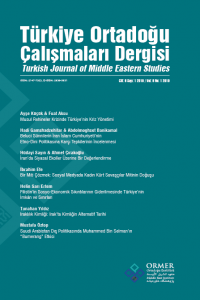Abstract
Bu çalışma, Beluci-Sünni
etnik azınlığının İran İslam Cumhuriyeti'nin asimilasyon temelli yaklaşımına
karşı tepkisini incelemektedir. Bu çalışmada İran teokratik siyasal sisteminin
asimilasyon temelli bir yaklaşım benimsediği ve Beluci-Sunnilerini egemen
etnik-dini grup olan Şii Farslar içinde asimile etmeye çalıştığı, ancak bu
politikanın toplumun farklı kesimleri tarafından direnişle karşılandığı iddia
edilmektedir. Sonuç olarak bu araştırma Beluci Sunniler arasında etno-dini
değerlerini korumak için genel bir fikir birliğinin olmasına rağmen, Beluci-Sunni
toplumunun her bir kesiminin kendine uygun olan ve kültürel çabalardan politik
ve askeri faaliyetlere kadar uzanan yöntemlerle merkezi hükümetin etno-dini
politikasına karşı mücadele ettiğni tespit etmektedir.
References
- The Ninth Majlis elections in Iran: Electoral laws, Procedures and Institutions, Intellectual Discourse, (Scopus indexed), vol. 21 no. 1, 2013
- Religion and Politics: An Analytical Inquiry of Contemporary Reform Movements in Iran (co-author), Tafhim: IKIM Journal of Islam and the Contemporary World, vol. 7, 2014
- The 11th Presidential Election in Iran, Akademika, Vol. 84 (3) 2014, Universiti Kebangsaan Malaysia.
- Shi’ism in the Islamic Republic of Iran; Its Muslim World Policy (co-author). Al-Shajarah, (ISI indexed), vol. 20, no. 1, 2015, Institute of Islamic Thought and Civilization,
- The Iranian Diaspora in Malaysia: A Socio-Economic and Political Analysis, Diaspora Studies, (Scopus Indexed), Issue 10, no. 1, 2016 Taylor & Francis
- Understanding Ethno-Religious Dynamics in the Islamic Republic of Iran. Analysis No. 1, November 2016. Center for Iranian Studies in Ankara, Turkey
- Tenth Majlis Election in Iran; 10th Majlis Election in Iran: Structural, Institutional, Legal, and Political Issues, Electronic Journal of Political Science Studies, Turkey, vol.8, no.1, 2017
- The Islamic Republic of Iran’s Networking Diplomacy in the Muslim World: The Case of Ahl-ul Bayt World Assembly activities in Malaysia and Afghanistan. Intellectual Discourse, vol. 25, Special Issue, 2017. (Scopus Indexed),
- The Iran’s Educational Diplomacy in the Muslim World: Activities of Al-Mustafa International University in Malaysia and Afghanistan, Insight Turkey, (Scopus Indexed), vol. 20, no. 1, 2017, Ankara, Turkey
- Evaluating the Islamic Republic of Iran’s Public Diplomacy. International Journal of Political Studies, vol. 4, no, 2, 2018, Sakarya University, Turkey
- Iran’s Aid Diplomacy in Afghanistan: The Role of Imam Khomeini Relief Committee, Contemporary review of the Middle East. Vo. 5, no. 4, 2018, (Sage Pub.), Jawaharlal Nehru University, India
Examining the Response of Baloch Sunnis to the Ethno-Religious Policy of the Islamic Republic of Iran
Abstract
This study investigates the response of the Baloch Sunni
ethno-religious minorty towards the assimilationist approach of the Islamic
Republic of Iran. It argues that the Iranian theocratic political system uses an assimilationist approach and
tries to assimilate the Baloch-Sunni into Shia Persain dominated
ethno-religious group; but, this policy has been resisted by different
strata of the society. The study finds that although there is a general
consensus among the Baloch Sunnis to uphold their ethno-religious values, each
segment of the Baloch Sunni society is combatting the central government’s
ethno-religious policy on its own way depending on the means available, ranging from
cultural efforts to political and military activities.
References
- The Ninth Majlis elections in Iran: Electoral laws, Procedures and Institutions, Intellectual Discourse, (Scopus indexed), vol. 21 no. 1, 2013
- Religion and Politics: An Analytical Inquiry of Contemporary Reform Movements in Iran (co-author), Tafhim: IKIM Journal of Islam and the Contemporary World, vol. 7, 2014
- The 11th Presidential Election in Iran, Akademika, Vol. 84 (3) 2014, Universiti Kebangsaan Malaysia.
- Shi’ism in the Islamic Republic of Iran; Its Muslim World Policy (co-author). Al-Shajarah, (ISI indexed), vol. 20, no. 1, 2015, Institute of Islamic Thought and Civilization,
- The Iranian Diaspora in Malaysia: A Socio-Economic and Political Analysis, Diaspora Studies, (Scopus Indexed), Issue 10, no. 1, 2016 Taylor & Francis
- Understanding Ethno-Religious Dynamics in the Islamic Republic of Iran. Analysis No. 1, November 2016. Center for Iranian Studies in Ankara, Turkey
- Tenth Majlis Election in Iran; 10th Majlis Election in Iran: Structural, Institutional, Legal, and Political Issues, Electronic Journal of Political Science Studies, Turkey, vol.8, no.1, 2017
- The Islamic Republic of Iran’s Networking Diplomacy in the Muslim World: The Case of Ahl-ul Bayt World Assembly activities in Malaysia and Afghanistan. Intellectual Discourse, vol. 25, Special Issue, 2017. (Scopus Indexed),
- The Iran’s Educational Diplomacy in the Muslim World: Activities of Al-Mustafa International University in Malaysia and Afghanistan, Insight Turkey, (Scopus Indexed), vol. 20, no. 1, 2017, Ankara, Turkey
- Evaluating the Islamic Republic of Iran’s Public Diplomacy. International Journal of Political Studies, vol. 4, no, 2, 2018, Sakarya University, Turkey
- Iran’s Aid Diplomacy in Afghanistan: The Role of Imam Khomeini Relief Committee, Contemporary review of the Middle East. Vo. 5, no. 4, 2018, (Sage Pub.), Jawaharlal Nehru University, India
Details
| Primary Language | English |
|---|---|
| Journal Section | Makaleler |
| Authors | |
| Publication Date | June 28, 2019 |
| Acceptance Date | May 14, 2019 |
| Published in Issue | Year 2019 Volume: 6 Issue: 1 |
Cited By
Pakistan’s Ethnic Parties’ Religious Narratives and Practices
The Review of Faith & International Affairs
https://doi.org/10.1080/15570274.2023.2235818
The published articles in TJMES are licensed under a
Creative Commons Attribution-NonCommercial 4.0 International License



